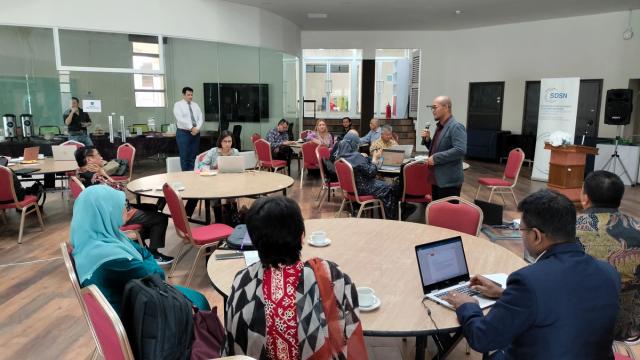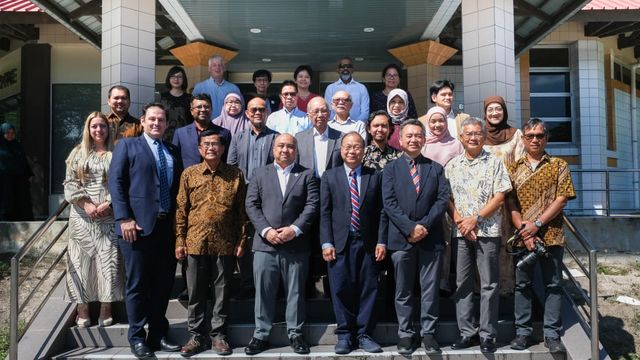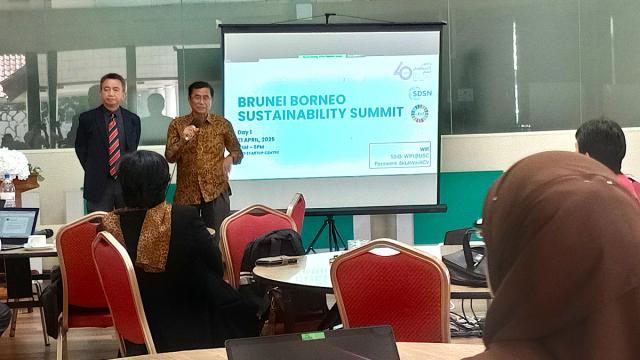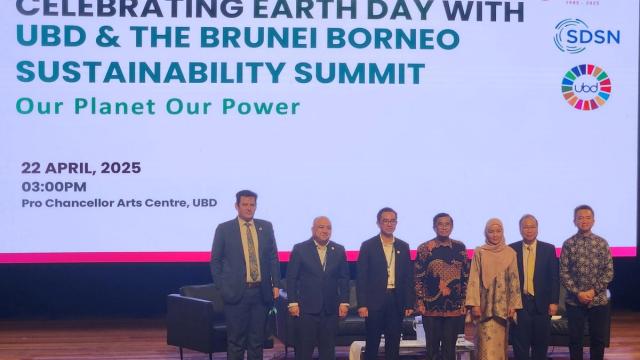Science Panel for Borneo Convenes for the Brunei Borneo Sustainability Summit
The UN Sustainable Development Solutions Network (SDSN), in partnership with Universiti Brunei Darussalam (UBD), co-hosted the Brunei Borneo Sustainability Summit (BBSS) in Bandar Seri Begawan this month. The BBSS marked the first time that 21 co-cluster leaders of the Science Panel for Borneo (SPB) met in person to plan next steps for the completion of the Borneo Assessment Report to be presented at COP30 in mid-November in Belém, Brazil.
The BBSS consisted of a two-day workshop (April 21-22, 2025) featuring 28 participants, including scientists and researchers from various fields from Malaysia, Indonesia, and Brunei. The workshop included comprehensive brainstorming sessions and in-depth discussions on the available material and plans for the Borneo Assessment Report; previously, SPB cluster leaders had only had piecemeal discussions online via Zoom. The BBSS concluded with a public Earth Day forum at the Pro Chancellor Arts Centre in UBD.
SPB Co-Chair Professor Dr. Mazlin Mokhtar greeted the participants with a sustainability-themed traditional Malay pantun:
Panel Sains Borneo Wadah Nusantara,
Demi kelangsungan Asia Tenggara,
Menggarap kepakaran usaha pulihara,
Sumber asli khazanah negara.
English translation: The Science Panel for Borneo is the platform of Nusantara, for the survival of Southeast Asia; To draw expertise to the restoration efforts of natural resources as national treasures.
The workshop was also a much-needed opportunity for building trust and understanding between clusters and cluster leaders of different countries. Cluster leaders presented their ideas and concerns, which allowed for inter-cluster cooperation and a shared vision to develop. Cluster presentations also seeded the ideas and avenues for cross-cluster contributions. Notably, Professor Jan Sopaheluwakan’s mega-framework presentation generated significant attention, and other participants identified the need to involve more Kalimantan-based researchers. The workshop also prompted the Indonesian cluster leaders to consider a second Indonesian SPB meeting later in the year to further attract contributors and to coordinate among themselves.
On the second day of the BBSS, an Earth Day event entitled “Celebrating Earth Day with UBD and the Brunei Borneo Sustainability Summit” was held at the Pro Chancellor Arts Centre. The vice chancellor of UBD, Dr. Hazri bin Haji Kifle, officiated the event, which attracted 100 guests from Brunei’s government and UBD partner stakeholders.
The event featured a panel composed of Professor Dr. Woo Wing Thye (Vice President of Asia and Head of the Kuala Lumpur Office), Professor Dr. Mazlin Mokhtar (SDSN Asia Office and Sunway University), Professor Dr. Jatna Supriatna (Universitas Indonesia), and Dr. Wardah Hakimah binti Haji Sumardi (Deputy Director of Sustainability, UBD). The discussion was moderated by Professor Dr. Basilios Tsikouras (Director of Research, UBD).
In the panel discussion, Professor Dr. Woo Wing Thye noted that smaller Southeast Asian countries like Brunei face a dilemma where their contribution to sustainability may be minuscule at the global level, but scale does change behavior. However, he noted that, without smaller countries leading the way to net zero, it would be impossible to convince larger countries to change their practices and fund the energy transition of smaller countries.
Professor Dr. Mazlin Mokhtar elaborated on the details of sustainability planning in his experience with the water sector transformation in Malaysia. He stressed the importance of human talent, data for decision-making, the implementation of good technology, and alternative methods of financing. He also noted the need to analyze the interconnections of water management with other dimensions of sustainability, such as food and energy. He raised the possibility of innovative solutions, such as a “cap-and-trade” system for water pollutants.
Professor Dr. Jatna Supriatna highlighted the importance of the SPB’s work, as Borneo is “the hot of the hotspot” because of its mega biodiversity, with 50 different ecosystems to preserve. He re-emphasized the need to reach into human, social, and natural capital to not just preserve but also to conserve.
Finally, Dr. Wardah Hakimah spoke on the role of social marketing for promoting sustainability, noting the gap between awareness about sustainability and individuals’ own actions. Social marketing helps to close this gap by defining the rewards for action and working towards mainstreaming sustainability into society. However, to ensure relevance and impact, intervention programmes need local insights and behavioural research.
The SPB is immensely grateful for UBD’s commitment to conservation and sustainability through this event, which marks an important qualitative next step in the SPB’s mission to lay the groundwork for Southeast Asian biodiversity protection as a whole. The SDSN is also proud to have Universiti Brunei Darussalam as a member of the network.
To learn more about the Science Panel for Borneo, visit the program page.



